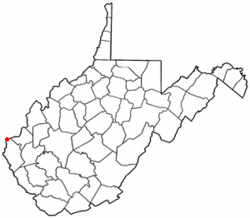Ceredo, West Virginia
| Ceredo, West Virginia | |
|---|---|
| Town | |

Looking east along U.S. Route 60 from C Street
|
|
 Location of Ceredo, West Virginia |
|
| Coordinates: 38°23′36″N 82°33′37″W / 38.39333°N 82.56028°WCoordinates: 38°23′36″N 82°33′37″W / 38.39333°N 82.56028°W | |
| Country | United States |
| State | West Virginia |
| County | Wayne |
| Area | |
| • Total | 2.26 sq mi (5.85 km2) |
| • Land | 1.53 sq mi (3.96 km2) |
| • Water | 0.73 sq mi (1.89 km2) |
| Elevation | 551 ft (168 m) |
| Population (2010) | |
| • Total | 1,450 |
| • Estimate (2012) | 1,412 |
| • Density | 947.7/sq mi (365.9/km2) |
| Time zone | Eastern (EST) (UTC-5) |
| • Summer (DST) | EDT (UTC-4) |
| ZIP code | 25507 |
| Area code(s) | 304 |
| FIPS code | 54-14308 |
| GNIS feature ID | 1537176 |
| Website | www.townofceredo.com |
Ceredo is a town in Wayne County, West Virginia, United States, along the Ohio River. The population was 1,450 at the 2010 census. Ceredo is a part of the Huntington-Ashland, WV-KY-OH Metropolitan Statistical Area (MSA). As of the 2000 census, the MSA had a population of 288,649.
The city is also near the location of the Southern Airways Flight 932 aviation disaster. On November 14, 1970, a McDonnell Douglas DC-9 airplane carrying the Marshall University football team crashed on a hillside on approach to the Tri-State Airport, killing all on board. A movie about the tragedy, We Are Marshall, was released in 2006.
Ceredo was so named by its founder because of the bountiful harvest of corn upon the site. The name is derived from Ceres, the goddess of corn and harvest.
New England Congregationalists founded Ceredo to demonstrate the superiority of an economic system not based on slave labor. Eli Thayer, an abolitionist congressman from Massachusetts, believed that bringing abolitionists like himself into southern states could ultimately bring about the end of slavery. While some welcomed the newcomers, several area newspapers published opinions against this "invasion." The newspaper of nearby Ashland, Kentucky, however, supported this move. By 1857, the city was fully established with a newspaper of its own and several industries.
With John Brown's raid at Harpers Ferry in 1859 and the outbreak of the Civil War in 1861, the situation for this abolitionist colony appeared bleak. Its purpose to bring about the peaceful end of slavery over, several residents volunteered for pro-Union regiments.
...
Wikipedia
